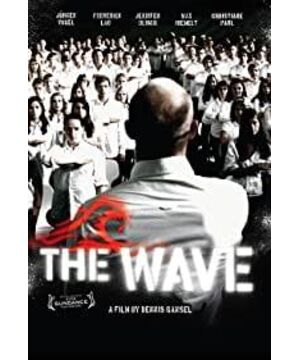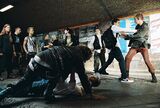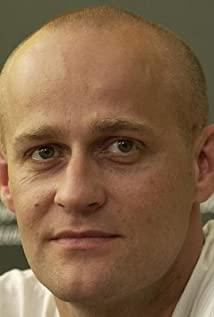The film is adapted from the novel of the same name, The Wave, by Todd Strasser, who wrote under the pseudonym Morton Rhue. The content of the novel is that in the late 1960s, a history teacher conducted a teaching experiment of "authoritarian dictatorship" in a California high school, but in the end it was out of control. Director Dennis Gansel (Dennis Gansel) did not use the original novel setting, but changed the story setting to today's Germany, and the time was changed from the original one semester to a one-week political science course. In this part, I think the screenwriter wants to add German history-Nazis-into the film elements, and limited by the length of the film, shortening the time can make the plot more compact, but relatively, the book uses a semester to spread out the atmosphere, It will make people unconsciously fall into the trap of totalitarianism. In the film, it is more like letting the audience be an outsider, watching the protagonist of the movie fall into madness like this, and in turn, compare whether their own consciousness is strong enough. "If I were a student in the movie, would I be like them?"
Synopsis:
Physical education teacher Rainer Wenger, played by Jürgen Vogel, originally wanted to teach "anarchism", but had to teach "dictatorship" under the arrangement of the school, because he had no interest in the subject. However, seeing that the students in the class also found this topic very boring, and thought that it was absolutely impossible for them to repeat the mistakes of history after learning from the "Nazi" history, Rainer suddenly thought: "Why not implement it on the spot?" Let him play the role The role of a totalitarian (this is determined by student voting), which stipulates that students must obey his orders during class, (because this farce is decided by students' vote, so they also surrender their personal freedom?), they gradually Form a "group" - a wave. Because the group image is clear and highly exclusive, it attracts more students to join. Of course, students who do not agree with these regulations will be excluded. Of all the students, Tim (Frederick Lau) is the most enthusiastic, and Marco (Max Riemelt)'s girlfriend Karo (Jennifer Ulrich) finds this activity interesting at first, but gradually finds that his free will is more and more limited. Therefore, the "anti-tidal movement" was launched, but the results were ineffective. Mrs. Wenger (Christiane Paul), who also teaches in the school, found that his husband underestimated the results of his experiment and believed that the students' thoughts should not be used in the experiment. He also pointed out that Rainer had his personal motivation behind doing this experiment. Summoning all the "Wave" members to deliver a speech that is deeply dictatorial in nature, the plot takes a sudden turn and the decision to disband "The Wave", but it is too late, Tim is too poisoned. The film ends with Tim committing suicide and Rainer being sent to a police car.
First, how did this group come about? At the beginning of the film, the teacher wrote Autokratie (autarchy in English, dictatorship) on the blackboard. Everyone has some ideas about this word. In the film, through the question and answer of teachers and students in the classroom, a totalitarianism (Totalitarianism) is revealed. ) should have:
Monday: The vote to the totalitarian is Mr. Wenger, who sets the ground rules – stand up when you speak, and quit if you don't.
Tuesday: Strength through discipline, Strength through community, Mr. Wenger asks the class to step on their feet and stomp on the "anarchism" class downstairs to create a sense of superiority and a sense of community (doing movements together), and finally importing a uniform outfit – wearing a white shirt to school.
Wednesday: Karo, as a non-gregarious person, instead gathered the consciousness of "same hatred" of all the students in the class. The group began to be exclusive since then. Mr. Wenger agreed to have a unified name, and finally voted for the wave, which appeared after class. Unified logo.
Thursday: Students invent a unified movement, the highest point of exclusivity, because only group members know the meaning of the symbol.
The purpose of these actions is to increase the centripetal force of the group members by eliminating the differences between the groups, making everyone a member of the group, and amplifying the differences between the group and others. And you can observe the development of the above four days, and find that the initiative has changed from teachers to students, from totalitarians to totalitarian groups. In contrast to German history, after World War I, Germany caused decades of social turmoil due to the Versailles Treaty. Hitler used utopia as an incentive to let the Nazis swept across Europe to form Totalitarianism. In the classroom, the interests of the group lie in "power" and "belonging." Tim is the most marginalized member of the class, and therefore the most frenetic in the wave, because he can feel "self-existence" in the group.
The most decisive difference between totalitarianism and other governments is - ideology, as in Hitler's claim to transform the world into a utopia, and in the film it is shown in the final Mr. Wenger/Rainer speech - National youth rambling! We will use this movement to save the country! Voltaire once said: "Chacun marche gaiement au crime sous la bannière de son saint." means "everyone holds the holy flag in his heart, and his face is full of red light to sin."
Before giving the speech, the teacher asked the students to write about their feelings about participating in the sport, and most of them mentioned "equality" and "freedom." This equality comes from the process of "de-similarity", while freedom comes from "power". This sounds good, but in fact there is a huge difference in essence between freedom and equality in totalitarian politics and freedom and equality in democratic politics. The equality of democratic politics is the equality of opportunities that people can create and develop, while the equality of totalitarian politics is equality under constraints and rules.
do you know? When I was watching this movie, it was so cold that I felt like I was in icy water. Why? Because I am also a teacher. Watching Mr. Wenger make students wear uniforms, stand at attention, and speak with the teacher's approval... Doesn't this remind you of our educational process? Compared with the "waves" in real life and movies, is it "if the similarity is purely coincidental"? In the movie, too many people are unable to gain the approval of their peers and turn to the "wave" to gain friendship. For example, Tim gave drugs to classmates at first, in order to break into some small groups and become part of them, but they really agreed with Tim. ? Not also. On the contrary, when he was bullied by his classmates, the Inspur members who also wore white shirts (who looked down on him originally) helped him, because "we are together", which made Tim die-hard to believe that Inspur was his only belonging.
The benefits of participating in the wave are not only that, some students have no focus in their lives, and they use group actions to develop their expertise and build self-confidence. Some students are not satisfied in their families and do not have enough sense of security, but they are recognized in the group and have emotional support. . From another angle, even Rainer, the initiator, felt inferior because of his wife's professional background, and at the same time enjoyed the pleasure of the students' obedience, and fell into totalitarianism and couldn't extricate himself. These reasons alone are not bad. People all have the need to find a sense of belonging. The brand preferences of favorite teams and boutique clothing mentioned in the chat, and even the quirks in living habits, these are the sources of the sense of belonging. It is because of human nature that the allure of totalitarianism is so high.
But where is the problem? is collective strength. I am alone, and I am weak, so I have to solve problems with skill or choose to tolerate it. But when a group of people are together, they can take advantage of the quick solution with brute force. At this time, Yuyong is encouraged. If you deliberately do things that go against the world's values, the group will see you as a hero, because the thrill of overthrowing tradition and overthrowing authority is the strongest aphrodisiac! The consequences of an individual's actions are generally borne by the group. At this time, some people will lose control. However, these loss of control are the beginning of pushing the group into the abyss, because the group will have to tolerate the loss of personal control, and more people will lose control. .
Are there any small groups on campus? have. But not every small group will eventually go to totalitarianism? Fortunately, it doesn't seem to be the case at the moment. As I just said, a key feature of totalitarianism is ideology, which usually refers to political ideology, nationalism, or national identity. These things are not too obvious on campus, and no one knows how to hype them. (Not necessarily after going out of the society...orz)
Back to the main body of the movie, I think there are two things that are a little pity. The first is that Karo's character creation is not so tasty, she should be a "bystander → participant" The process of → uncooperative → expelled", unfortunately, she was pulled away if she did not participate enough, and the point of non-cooperation was not strong enough to resonate, causing her actions after she was expelled to look like a little girl arrogantly in a tantrum. The second is at the end. Tim’s suicide by shooting a gun is very entertaining and visually shocking, but I am looking forward to the group consciousness of the wave after Mr. Wenger persuaded everyone to disband the wave as a totalitarian leader (?) They should operate on their own, dismiss Mr. Wenger as a traitor, and continue their frenzy, but... no, everyone just disbanded? With Tim's enthusiasm, when Mr. Wenger asked for dissolution, he should take the lead in protecting the group and replace Mr. Wenger's leadership position?
But this little defect does not affect the fluency of the whole film and the totalitarian values that the director wants to convey.
View more about The Wave reviews











